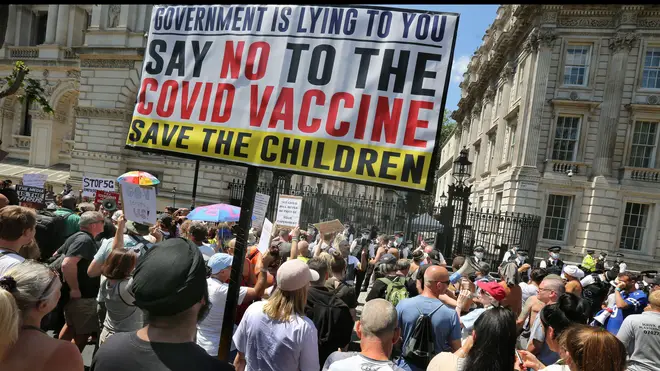
Shelagh Fogarty 1pm - 4pm
3 September 2021, 22:54 | Updated: 3 September 2021, 23:36

The decision to not recommend vaccinating healthy teenagers against coronavirus may help instil trust in the vaccines and the scientists behind them, a JCVI scientist has said.
Speaking to LBC’s Andrew Pierce, Professor Robert Read of the Joint Committee on Vaccination and Immunisation (JCVI) said that the advice to not vaccinate healthy 12 to 15 year olds would "strengthen" the general public’s trust in the vaccines and the scientists behind them.
"We do advise vaccination when we think it’s necessary but we don’t advice vaccination when we don’t think it’s necessary," said Prof Read, a professor of infectious diseases at the University of Southampton, when asked if the advice would fuel the doubts of anti-vaxxers and vaccine sceptics.
"We’re just being completely honest with the Government about exactly what we should be doing with children in terms of their own health.
"In fact [the decision not to vaccinate healthy 12 to 15 year olds] strengthens the correct use, the perception of the correct use, of vaccination in the population."
Read more: Five police officers injured and 10 arrests made as anti-vaxx mob runs amok across London
Read more: Vaccination of healthy children aged 12 to 15 not recommended by government advisers
He said the job of the JCVI was "purely and simply" to advise the Government from a scientific perspective.
"The JCVI makes decisions for the benefit of the UK population," he said.
"It’s our job to give the Government advice on how to use vaccines to protect people’s health.
"It's purely and simply that."

Prof Robert Read from JCVI speaks to Andrew Pierce on vaccines for kids
When asked about the decision not to vaccinate this particular group, Prof Read said: "In this case it was decided that the benefit to children aged between 12 and 15 who are otherwise healthy is too small for us to confirm advice to vaccinate four million children."
He said that the risks of Covid-19 to healthy children are "very small indeed", and so the JCVI made the decision not to recommend it purely on health grounds.
For more vulnerable children – including those with blood cancer, sickle cell disease, type 1 diabetes, congenital heart disease, asthma and other respiratory conditions – Prof Read said the risk "is still relatively small compared to adults but it is larger", hence the decision to recommend vaccination for these children.
Read more: Government scientists receive 'suspicious packages' and abuse from anti-vaxxers
Read more: 'Daddy keep away from me': Caller tells of daughter 'driven' by Covid conspiracies
He said part of the reason not to vaccinate healthy teenagers was the possibility of a side effect known as myocarditis – inflammation of the heart muscle – that, whilst "extremely rare", appears to be slightly more common in young children.
Data from the United States suggests the condition occurs in approximately 40 cases per million doses of a vaccine given.
"But the question that arises for us is: could it possibly be more common than we actually realise? Could it be occurring without us being aware that it’s occurring?" Said Prof Read.
"There are a lot of unknown factors involved in the decision, so in view of the fact that the benefit to the children is marginal we’ve taken the precautionary step of saying 'we don’t know about the long term effects of this vaccine in 12 to 15 year old healthy children' and therefore the marginal benefit that they would experience from vaccination cannot be universally justified.
"And that’s all we’re saying."

Geoff Barton reacts to JCVI announcement on 12 to 15 year-old jabs
Prof Read was also asked about the plans for booster shots for vulnerable people.
He said that a booster programme was something that the JCVI discussed "virtually every day".
“My personal view is that people who are highly vulnerable may indeed benefit from an additional booster dose later in the year,” said Prof Read, but he emphasised this was his opinion and not a conclusion from the JCVI.